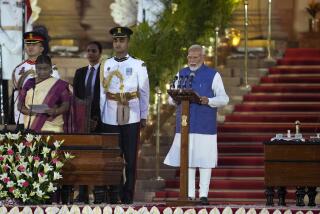New Indian Government Takes Power
- Share via
NEW DELHI — Indian Prime Minister Manmohan Singh’s new coalition government took power Saturday, promising more money for social programs and more taxes to pay for them.
Singh, India’s first Sikh prime minister, was sworn in by President A.P.J. Abdul Kalam, the Muslim father of the country’s nuclear missile program. But as negotiations on Cabinet appointments continued in the hours before the ceremony, it was clear that Italian-born Sonia Gandhi remained a powerful force behind the new government after suddenly stepping aside as its candidate for prime minister last week.
Gandhi, the widow of assassinated former Prime Minister Rajiv Gandhi, is still president of the Congress Party. It leads a coalition of more than a dozen parties.
Singh, 71, was at Gandhi’s residence until about 2 a.m. Saturday negotiating over which coalition partner would get what share of the Cabinet posts, and who would get the most powerful positions. After the leaders settled on 62 Cabinet members, the number swelled to 67 in the final hours before they and Singh took the oath of office.
Singh said he would announce the Cabinet members’ portfolios today, but local press reports said the new prime minister might also head the sensitive finance and defense ministries until he could find acceptable ministers. Singh, sworn in beneath glittering chandeliers in the presidential mansion, is the 13th prime minister to lead the world’s largest democracy since independence from Britain in 1947.
Pranab Mukherjee, a former finance and foreign minister, was the first member of Singh’s Cabinet to take the oath of office. Local reports say Mukherjee is expected to get the powerful Home Ministry, which would put him in charge of several key security forces.
The position was held by Lal Krishna Advani, a hard-line Hindu nationalist, in former Prime Minister Atal Behari Vajpayee’s government. Advani is widely expected to take over as leader of the opposition if the 79-year-old Vajpayee retires from politics.
Singh’s foreign minister is expected to be Natwar Singh, a former ambassador to Pakistan and head of the Congress Party’s foreign policy section. The incoming foreign minister will immediately be tested by landmark peace talks with neighboring Pakistan, whose president, Pervez Musharraf, is pressing for a quick solution to the 57-year conflict over the divided territory of Jammu and Kashmir.
A week ago, Natwar Singh hinted that the new government would try to persuade Pakistan to accept more gradual progress on a range of issues, rather than an early, final deal on Kashmir.
“We will urge Pakistan to look at the example of our relations with China,” he told a local newspaper. “Even though we have a border dispute with them, we have moved ahead in cooperation in other areas.”
Laloo Prasad Yadav, the former chief minister of impoverished Bihar state, is expected to get a senior Cabinet post even though he is fighting criminal charges stemming from the alleged theft of $280 million from the state treasury that was supposed to help farmers feed their livestock.
Yadav, the fifth minister sworn in Saturday, has gone to jail at least five times, and spent more than 200 days behind bars in connection with the investigation of what Indians call the 1996 “fodder scam case.”
When Yadav was forced to resign as Bihar’s chief minister in 1997, his wife, Rabri Devi, quickly assumed power in the country’s second most populous state. Yadav’s power to mobilize millions of low-caste Hindus in support of Gandhi’s alliance allowed him to drive a hard bargain for a senior role in the new government.
Manmohan Singh, an Oxford-educated economist with long experience in public service, will need sharp political skills to keep such a diverse coalition together.
He is known as an unassuming, hardworking consensus builder, but he is a technocrat, not a professional politician. Singh has never won a seat to India’s lower house, but sits in the upper assembly, whose members are chosen by state legislatures.
At least six of the new Cabinet members are women, two of them low-caste Dalits who still suffer severe discrimination despite laws that are supposed to break down centuries-old barriers between castes.
The Cabinet also includes at least seven Muslims. Around 140 million of India’s 1 billion people are Muslims. That’s almost as many as in neighboring Pakistan, which the British created in 1947 as a separate homeland for Muslims on the subcontinent.
Singh’s United Progressive Alliance coalition government has pledged to end what it says were policies of Vajpayee’s Hindu nationalist government that widened the sectarian divide, such as rewriting school textbooks to highlight ethnic and religious differences.
More to Read
Sign up for Essential California
The most important California stories and recommendations in your inbox every morning.
You may occasionally receive promotional content from the Los Angeles Times.













